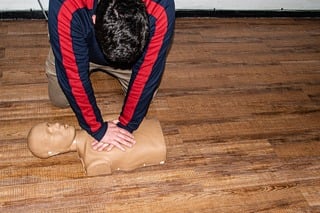Life-Saving Skills at Your Fingertips: The Importance of CPR Training

As the warm #summer months approach, families flock to pools, beaches, and lakes to beat the heat and enjoy quality time together. However, with the increased water activities comes the risk of drowning accidents. While no one wants to imagine such a harrowing scenario, being prepared with life-saving skills like cardiopulmonary resuscitation (CPR) can mean the difference between life and death.
Drowning is a leading cause of accidental death, particularly among children under the age of four. According to the Centers for Disease Control and Prevention (CDC), drowning claims the lives of approximately 4,000 individuals in the United States each year. These sobering statistics underscore the critical importance of having CPR knowledge readily available.
#CPR is a life-saving technique that can restore breathing and circulation in individuals who have experienced cardiac arrest or near-drowning. By applying chest compressions and rescue breaths, CPR helps oxygenate the brain and vital organs, increasing the chances of survival until professional medical assistance arrives.
While the idea of performing CPR may seem daunting, it is a valuable skill that can be acquired through proper training. In today's fast-paced world, finding the time to attend in-person CPR classes can be challenging, but fear not – the rise of blended learning options has made this essential training more accessible than ever before.
Introducing Blended CPR Training: Convenience Meets Effectiveness
Blended CPR training combines the best of both worlds: online learning and in-person practice. This approach allows individuals to complete the theoretical portion of the course at their own pace, from the comfort of their homes or on-the-go. The online component covers essential topics such as recognizing the signs of cardiac arrest, understanding the CPR steps, and learning about automated external defibrillators (AEDs).
Once the online portion is completed, learners attend a hands-on, in-person session with a certified instructor. During this session, participants have the opportunity to practice their CPR skills on specialized mannequins, receive feedback, and ask questions in a supportive environment.
The blended format offers several advantages:
- Flexibility: Online learning allows individuals to fit the coursework into their busy schedules, making it easier to balance work, family, and personal commitments.
- Convenience: No need to travel or rearrange schedules for multiple in-person sessions – the online component can be completed at your own pace, anywhere with an internet connection.
- Engagement: Online modules, videos, and quizzes make the learning experience more engaging and help reinforce key concepts.
- Hands-on Practice: The in-person component ensures that learners receive personalized guidance and feedback, ensuring they feel confident in performing CPR correctly.
For those working in the childcare industry or caring for children, ChildCareEd offers a comprehensive blended CPR and First Aid training program tailored to their specific needs.
The Importance of Preparedness
While no one wants to encounter a life-threatening #emergency, being prepared can make a world of difference. CPR training not only equips individuals with the skills to potentially save lives but also instills a sense of confidence and empowerment.
Imagine being at a family gathering or a childcare facility when someone suddenly collapses or a child starts struggling in the water. Having the knowledge and ability to perform CPR can turn a potentially tragic situation into a lifesaving moment. The feeling of being able to take action and make a positive impact is invaluable.
Furthermore, CPR training promotes a culture of preparedness and #safety awareness. By taking the initiative to learn these skills, individuals demonstrate their commitment to the well-being of their loved ones, colleagues, and communities.
Embrace the Convenience of Blended Learning
In today's fast-paced world, the blended learning approach offers a convenient and effective solution for acquiring CPR and First Aid training. With the online component providing flexibility and the in-person session ensuring hands-on practice, this method caters to diverse learning styles and busy schedules.
For those working in the childcare industry or caring for children, ChildCareEd's blended CPR and First Aid training program provides a comprehensive and tailored solution. By equipping caregivers with these life-saving skills, they can create safer environments for the children under their care and foster a sense of security for #parents and families.
Don't wait until an emergency strikes – take action today and empower yourself with the knowledge and skills to potentially save a life. Embrace the convenience of blended CPR training and prioritize the safety of your loved ones, colleagues, and community.
Enroll in ChildCareEd's First Aid and CPR Training Today
- Looking for a Career Change?
- Maryland! Get your First Aid and CPR certification!
- 8 Benefits of First Aid and CPR training
- Social Media Usage in Children: Risks and Safety Tips
- National Grandparents' Day: Timeless Life Lessons from Grandparents
- Save Lives With Skill: CPR Training
- First Aid for Frosty Fingers: Holiday Safety and CPR Tips Every Parent Should Know
- Why Every Childcare Worker Needs This CPR & First Aid Training
- Why Every Caregiver Needs Adult, Child, and Infant CPR Training
- Why Every Parent and Educator Should Learn Adult, Child, and Infant CPR
- Basic Health and Safety Training: Essential Skills Every Preschool Teacher Needs
- When Seconds Count: Real-Life Cases Where Health & Safety Training Saved Lives
- From Tummy Time to Safe Sleep: SIDS and Safe Sleep Online Training for MD Childcare